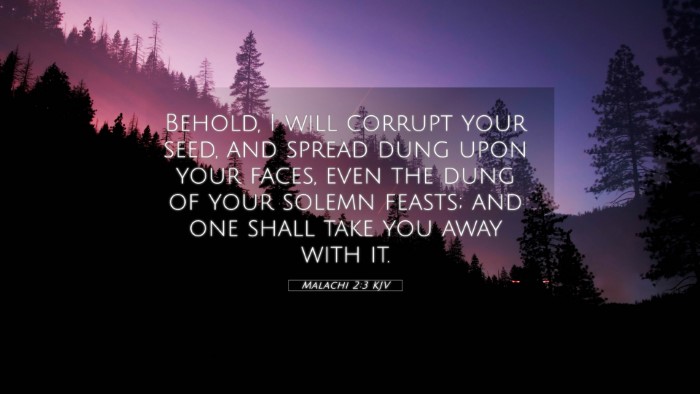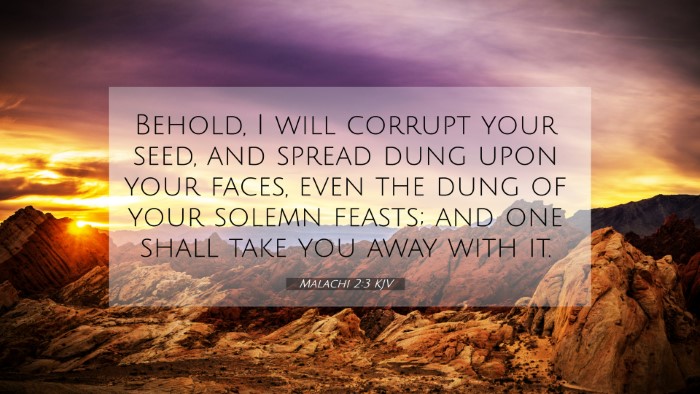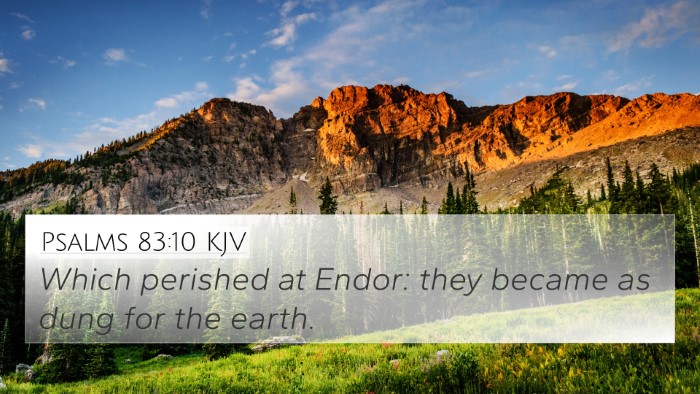Old Testament
Genesis Exodus Leviticus Numbers Deuteronomy Joshua Judges Ruth 1 Samuel 2 Samuel 1 Kings 2 Kings 1 Chronicles 2 Chronicles Ezra Nehemiah Esther Job Psalms Proverbs Ecclesiastes Song of Solomon Isaiah Jeremiah Lamentations Ezekiel Daniel Hosea Joel Amos Obadiah Jonah Micah Nahum Habakkuk Zephaniah Haggai Zechariah MalachiMalachi 2:3 Similar Verses
Malachi 2:3 Cross References
Behold, I will corrupt your seed, and spread dung upon your faces, even the dung of your solemn feasts; and one shall take you away with it.
Uncover the Rich Themes and Topics of This Bible Verse
Listed below are the Bible themes associated with Malachi 2:3. We invite you to explore each theme to gain deeper insights into the Scriptures.
Malachi 2:3 Cross Reference Verses
This section features a detailed cross-reference designed to enrich your understanding of the Scriptures. Below, you will find carefully selected verses that echo the themes and teachings related to Malachi 2:3 KJV. Click on any image to explore detailed analyses of related Bible verses and uncover deeper theological insights.

Nahum 3:6 (KJV) »
And I will cast abominable filth upon thee, and make thee vile, and will set thee as a gazingstock.
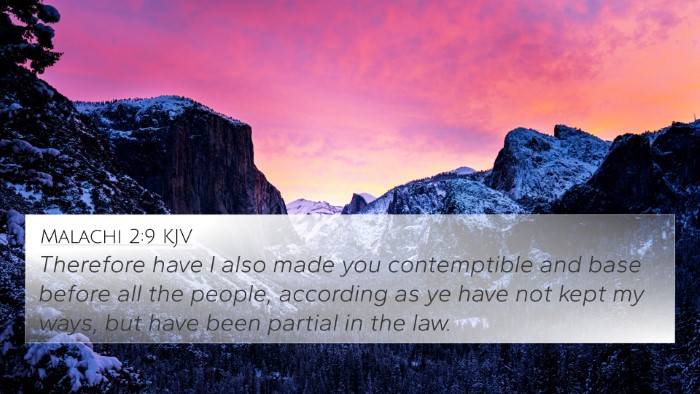
Malachi 2:9 (KJV) »
Therefore have I also made you contemptible and base before all the people, according as ye have not kept my ways, but have been partial in the law.
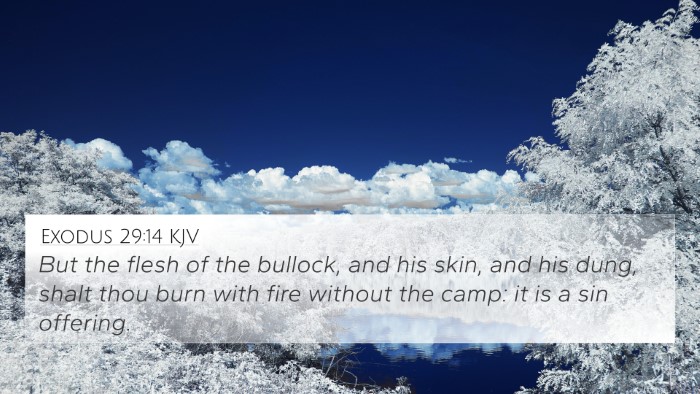
Exodus 29:14 (KJV) »
But the flesh of the bullock, and his skin, and his dung, shalt thou burn with fire without the camp: it is a sin offering.
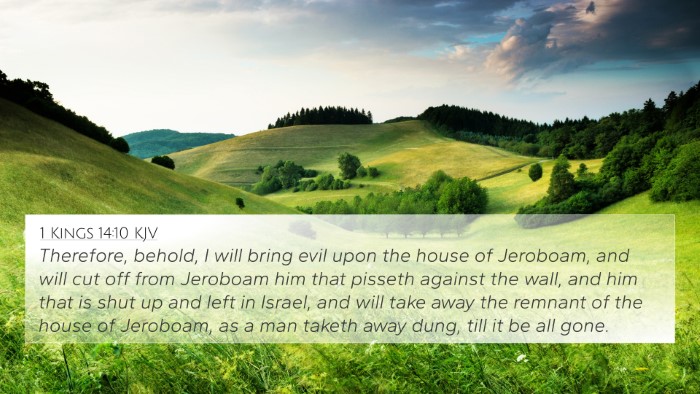
1 Kings 14:10 (KJV) »
Therefore, behold, I will bring evil upon the house of Jeroboam, and will cut off from Jeroboam him that pisseth against the wall, and him that is shut up and left in Israel, and will take away the remnant of the house of Jeroboam, as a man taketh away dung, till it be all gone.
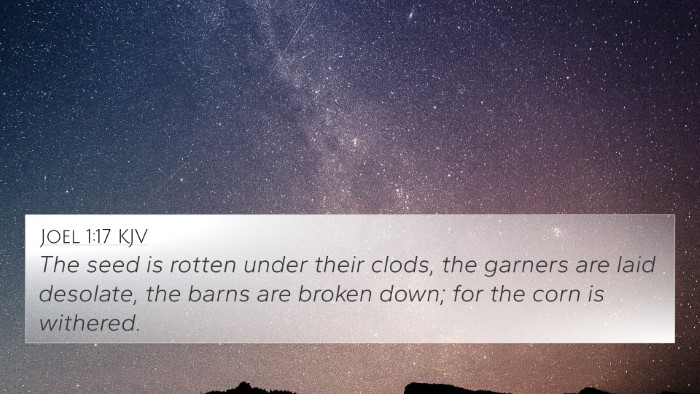
Joel 1:17 (KJV) »
The seed is rotten under their clods, the garners are laid desolate, the barns are broken down; for the corn is withered.
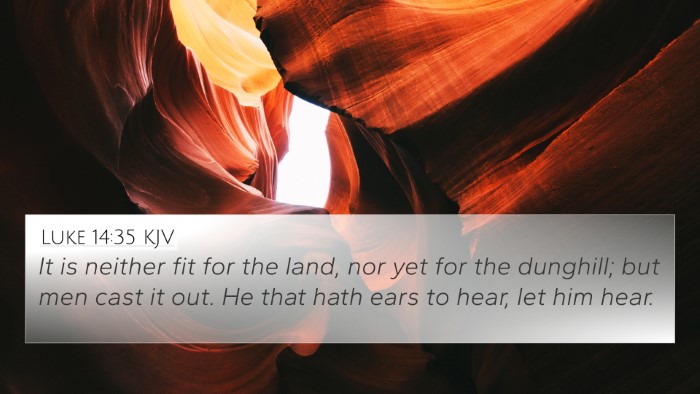
Luke 14:35 (KJV) »
It is neither fit for the land, nor yet for the dunghill; but men cast it out. He that hath ears to hear, let him hear.
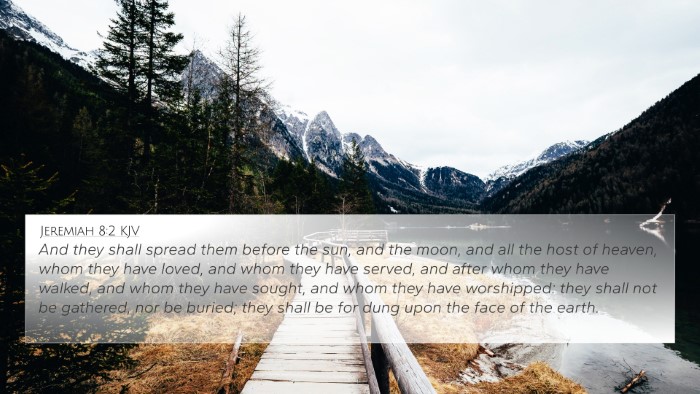
Jeremiah 8:2 (KJV) »
And they shall spread them before the sun, and the moon, and all the host of heaven, whom they have loved, and whom they have served, and after whom they have walked, and whom they have sought, and whom they have worshipped: they shall not be gathered, nor be buried; they shall be for dung upon the face of the earth.

Job 20:7 (KJV) »
Yet he shall perish for ever like his own dung: they which have seen him shall say, Where is he?
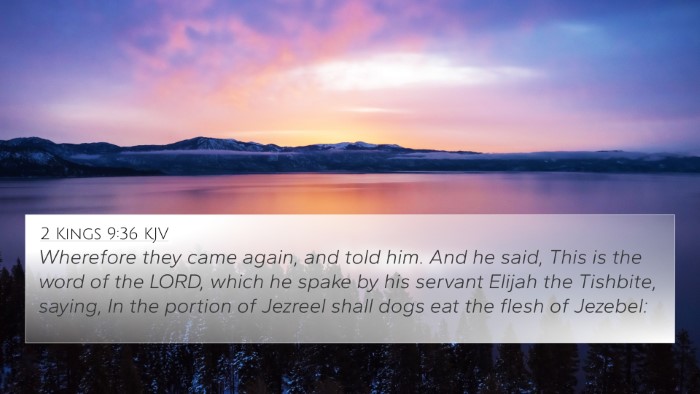
2 Kings 9:36 (KJV) »
Wherefore they came again, and told him. And he said, This is the word of the LORD, which he spake by his servant Elijah the Tishbite, saying, In the portion of Jezreel shall dogs eat the flesh of Jezebel:
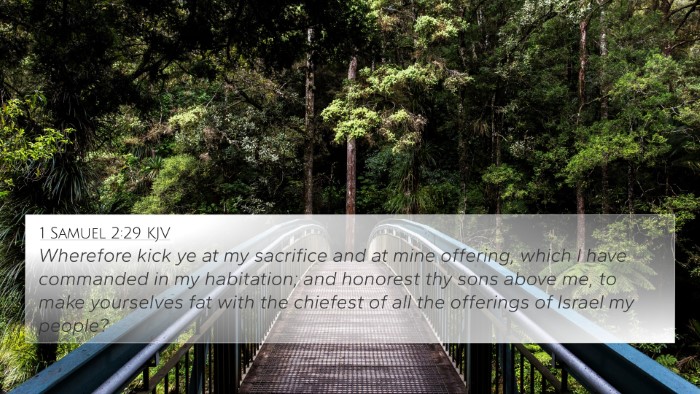
1 Samuel 2:29 (KJV) »
Wherefore kick ye at my sacrifice and at mine offering, which I have commanded in my habitation; and honorest thy sons above me, to make yourselves fat with the chiefest of all the offerings of Israel my people?
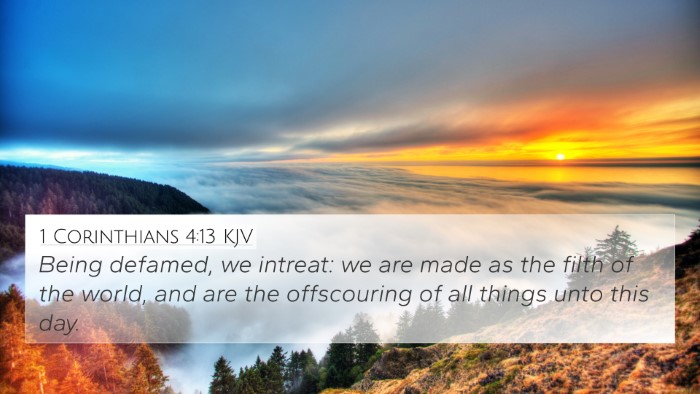
1 Corinthians 4:13 (KJV) »
Being defamed, we intreat: we are made as the filth of the world, and are the offscouring of all things unto this day.
Malachi 2:3 Verse Analysis and Similar Verses
Understanding Malachi 2:3
Verse Reference: Malachi 2:3 - "Behold, I will rebuke your descendants and spread refuse on your faces, the refuse of your solemn feasts; and one will take you away with it."
Context and Background
The Book of Malachi serves as the final prophetic text of the Old Testament, directed towards the people of Israel during a time when they had returned from exile but had grown complacent in their worship. Malachi addresses issues of faithfulness and sincerity in worship, particularly calling out the priests for their unfaithfulness and inappropriate offerings to God.
Key Themes
- Divine Judgment: The verse illustrates God’s judgment on the priests and their descendants for their corruption.
- Significance of Holiness: The refuse signifies the dishonor brought upon sacred practices due to unfaithfulness.
- Consequences of Sin: The consequences extend beyond the individual, impacting future generations.
Insights from Commentaries
Matthew Henry's Commentary
Matthew Henry notes that God is not indifferent to the conduct of His people, especially leaders. The "refuse" here symbolizes the treatment of sacred things lightly and shows how God will expose their sins publicly, reflecting His displeasure.
Albert Barnes' Commentary
Albert Barnes highlights the notion of divine retribution. He points out that the “refuse” on their faces signifies mockery, indicating that God will humiliate them in front of the people for their actions.
Adam Clarke's Commentary
Adam Clarke emphasizes the seriousness of the transgressions of the priests and outlines how their actions have turned away God’s favor. He discusses the need for repentance and the urgent call back to holiness in worship practices.
Cross-References and Thematic Connections
This verse connects with several other portions of Scripture that discuss themes of judgment, leadership accountability, and the sanctity of worship:
- Numbers 18:32: Discusses the holiness required in offerings, correlating with Malachi’s emphasis on proper worship.
- Jeremiah 7:21-23: God desires obedience over sacrifices, mirroring the sentiments in Malachi regarding hollow religious observance.
- Ezekiel 44:10-16: Discusses the duties and purity of priests, which connects with the unfaithfulness noted in Malachi 2:3.
- Hosea 4:6: Highlights the consequences of ignoring knowledge and truth, paralleling how the priests have failed to uphold God’s standards.
- Matthew 23:27-28: Jesus condemns religious leaders for hypocrisy, akin to the rebuke in Malachi for priests’ corruption.
- James 3:1: Warns that teachers will be judged more strictly, emphasizing the weight of responsibility on spiritual leaders.
- Revelation 2:5: Calls churches to remember their first love and repent if they have strayed, resonating with the call for reform in Malachi.
- 1 Peter 4:17: Indicates that judgment begins at the household of God, which syncs with Malachi’s focus on the priests.
Thematic Bible Verse Connections
For those studying the connections between Bible verses, this verse can serve as a key point in examining the thematic significance of judgment and repentance:
- Cross-referencing Biblical texts: Malachi encourages readers to explore various themes of divine rebuke throughout Scripture.
- Bible chain references: Linking Malachi 2:3 with the New Testament’s teachings regarding leaders’ responsibilities adds depth to the understanding of spiritual accountability.
- Comprehensive Bible cross-reference materials: Utilizing tools from a Bible concordance can uncover additional layers of meaning in connecting verses.
Conclusion
Malachi 2:3 serves as a powerful reminder of God’s demand for holiness and sincerity in worship. Through cross-referencing with other scriptural passages, one can find a broader understanding of God’s character and expectations, emphasizing the continuity of His message throughout the Bible.
Further Study Suggestions
For deeper insights, consider engaging in:
- Cross-reference Bible study: Investigate how themes of judgment manifest across both Testaments.
- Identifying connections between Old and New Testament: Learn how the messages of the prophets inform the teachings of Christ.
- Comparative Bible verse analysis: Delve into assessments of how different Bible verses speak to similar themes across diverse contexts.

